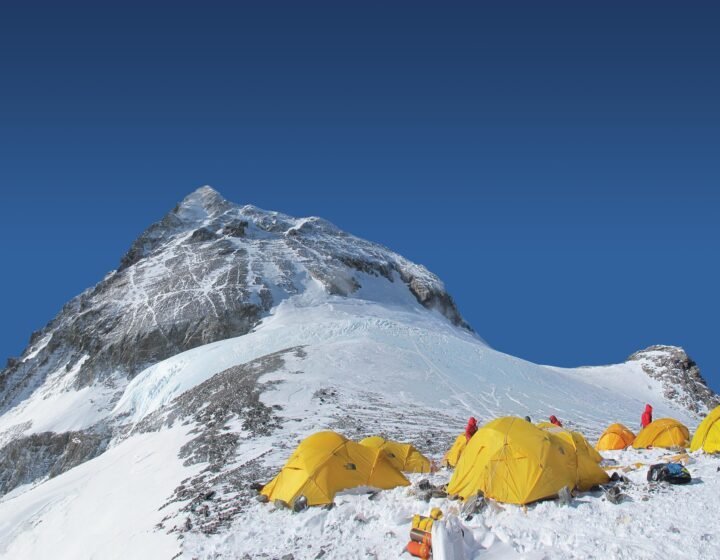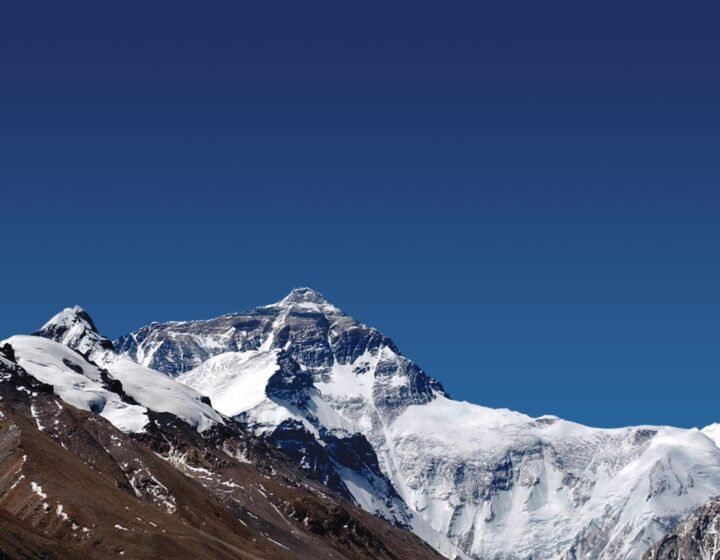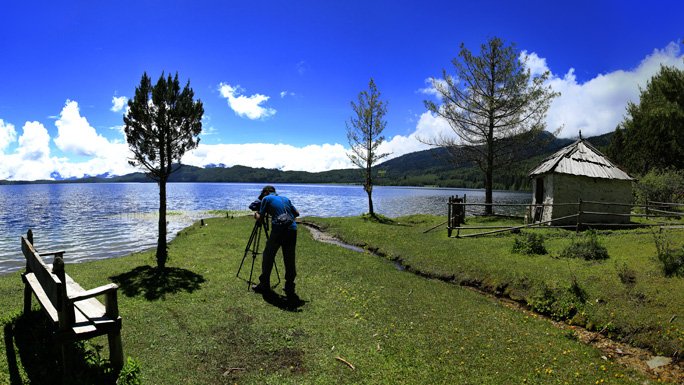- Details
Detailed itinerary
Itinerary- Tour Includes/Excludes
- Useful Info
- Trip Map
- FAQ
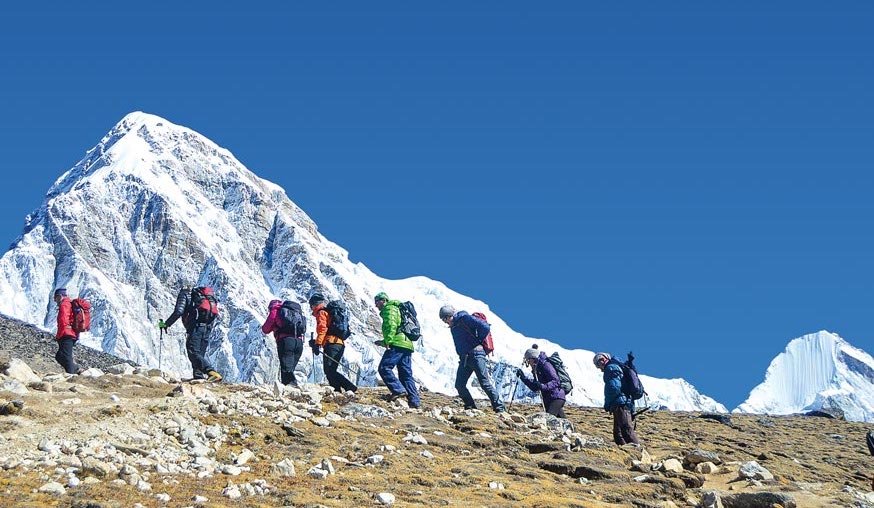
Trip overview
The Everest Kalapatthar Gokyo Ri Trek is one of the best combinations for travelers who want to enjoy the view of the Everest region in one journey. However, the trial will be more exciting and exhausting because of the long itinerary and heavy equipment. It would be a plus point for trekkers if they already have experience in trekking and hiking. You will get the opportunity to admire the beauty of mountains, lakes, and sunrises in just one package.
Gokyo Lake is also part of one of the world’s biggest aquatic reservoirs. Furthermore, you can also have a view of Nepal’s longest glacier, Ngozumpa Glacier, from Gokyo lake which is equally enthralling. The Gokyo Lakes are a collection of six bodies of water, or lakes, located in the Gokyo Valley at elevations ranging from 4700 to 5000 meters. The Sagarmatha National Park includes the Gokyo Valley.
The splendor of the lake still boasts spectacular vistas of Everest. The trial also offers overnight lodging at different stops, including Namche Bazaar, the entrance to the Khumbu Region. If the people don’t feel that they can continue to Gokyo, then for beginning visitors, Gokyo is optional and they can target their final destination on the Everest base camp.
Enjoy the hospitality of friendly local Sherpas in their communities and learn about Buddhist culture as you trek the Gokyo trail. Take advantage of your opportunity to see authentic Buddhist culture and highland Tibetan monasteries, and stroll along the beautiful trails of the World Natural Heritage Site Sagarmatha National Park.
Highlights:
- Awe-inspiring views of the Himalayas and Mt. Everest (8,848.86m) and Kalapattar.
- The Sherpa settlement of Namche Bazaar.
- Diverse cultures and customs extend a warm welcome.
- The mountain man, Yeti, and the Himalayas;
- A view of five sacred lakes and the world’s biggest glacier, Nazumpa;
Itinerary
Day 01: Arrive in TIA, Kathmandu 1300mWe fly back to Kathmandu from Lukla in the morning and transfer to the hotel. There will be plenty of time to make your decision.
Today will be the most exciting day as your guide introduces you to our city tour expert, who will guide you to the most pious Hindu and Buddhist religious places that are listed as world heritage sites and will explain the entire mysticism surrounding their existence.
Next, we take a flight to Lukla, which almost takes 30 to 45 minutes to reach. After our landing, we tightened our shoelaces for the trek to Phakding (2610m).
From there, we trek by endearing the magnificent beauty of Kusum Kanguru, Mt. Kwondge, and on the way, finally, we spend our night at the lodge of Phakding.
On our next day, it takes almost 5 hours of continuous walking to Namche Bazar. The trail offers the best views of waterfalls, helmets, local people, cultural richness, and wildlife diversity. We reach Namche Bazar in the evening time by taking 10-minute breaks at the picture spot to capture some selfies and videos and staying overnight at Namche Bazar.
You might have an idea behind acclimatization. As you are proceeding to the elevated elevation, it is recommended to have a short day hike to Thame, Khumjung, or Khunde. If you get some time, then you can go for a stroll and explore Namche and the Sherpa culture. Stay overnight in Namche Bazaar.
After exploring the beautiful place of Namche Bazar, we will head to Khumjung. Khumjung is a stunning place with lovely ethnic groups. On that, we will be staying at Khumjung teahouse lodge and spending the night there.
Today you will set another milestone towards Dole (4110m) by soaring up to Namche Bazaar. From Kyangjuma village, you can see Thamserku and Amadablam. You will travel through the Mong La to enjoy a lovely view of the valley and snow-capped mountains. Namche Bazaar will put forward the natural flora and fauna. Stay overnight on Dole.
The whole trek might take you 4 to 5 hours to complete. During the trial, you will get to observe amazing scenic views of mountains and long, shiny rivers. We will stay at Machherm at night and enjoy the cultural food of that area.
You will get a chance to get a perfect view of Gokya Lake after completing 6-7 hours of trekking from Machherma. The site is overwhelmed with stunning structures and a welcoming environment.
Climbing to Gokyo Ri (5357m) and stepping down to Dragonag (4700m) on Day 10 (6-7 hrs) will be worth it for visitors; there your soul will be rejuvenated by the several diverse beauties of nature.
Climbing to Gokyo Ri will be worth it for visitors, there your soul will be rejuvenated by the several diverse beauties of nature.
The trek from Chola Pass to Zongla is full of impressive views and adventure. The trial takes a 6–7-hour walk, which might be too tiring for you. So, to be ready for the next destination, we will take a rest in Zongla.
The trip will start in the Alpine region. The day’s rest destination will be Lobuche (4910m) by crossing the icy river in the Thukla glacier.
In comparison to another trek, it demands more walking and strength as well because of its difficult structures and high altitude. The trek almost takes 6-7 hours of walking with amazing views of the mountain glacier.
The trek from Kalapathar to Lobuche offers the best views of the Himalayans and beautiful glaciers.
On the next day, we will trek to Chhukung, where all travelers get to enjoy snow-capped mountains.
The trek to Chhukung Ri almost takes 5 hours of walking. From here, you can see a stunning panoramic view of numerous mountains and glaciers. Continuing the trek, you will return to Chhukung, 4730m. Spend the night in Chhukung.
After completing the trek to Chhukung, you will make use of it by trekking to Tengboche (3,830 m) for 5 hours. Starting the trek from the tranquil Khumjung to Khumbila Peak, the trek will continue to the Tengboche monastery.
On the following day, you will trek back to Monjo via Namche (3440m), taking 6 to 7 hours. After arriving in Namche, you will visit the local shops from where you can buy the local handicrafts crafted by the natives. You can also enjoy the culture of the Sherpa people and their daily activities by staying with them. Stay overnight in Namche Bazaar. The following day, you will trek back to Monjo via Namche (3440m), which will take 6 to 7 hours. When you arrive in Namche, you will visit the local shops to purchase local handicrafts made by the locals. You can also experience the Sherpa people's culture and daily activities while staying with them. Spend the night in Namche Bazaar.
After breakfast the next day, you will begin your trek to Lukla, at 2827m. The trek from Namche Bazaar will take about 4-5 hours. Because the weather in Lukla cannot be predicted, trekking companies frequently include an extra day for Lukla. However, if you travel during the right season, you may be able to travel on the same day. Spend the night in Lukla.
This will be a thrilling and exciting flight. When you arrive at TIA, you will be picked up and transferred to the hotel, where you can relax in a comfortable bed. In the evening, you will return to the hotel to finish the brief sightseeing before attending a farewell dinner. Spend the night in Kathmandu.
On this day, after 21 days, you will return to your hometown. You will be safely transported to the airport and then depart from us.
Included
- Pick up you at the airport by our personal vehicles
- Welcome and Farewell dinner with a cultural program
- 4 nights' tourist standard hotel accommodation in Kathmandu on a B/B basis.
- Half-day guided city tour with admission permit
- Local bus transportation from Kathmandu to Bhandar; flight ticket from Lukla to Kathmandu plus airport tax.
- Standard Lodge Accommodation (best available) with a twin-sharing basis during the trek.
- Manage three meals a day including Breakfast, Lunch, and Dinner
- Fees for a trekking permit and a Trekker's Information Management System (TIMS) card.
- Professional and highly experienced trekking guide with a government license.
- Porters to carry luggage.
- All expenses of the staff (Guides/Porters) include food, accommodation, salary, insurance, and equipment during your travel period.
- All the necessary trekking gear for porters, like jackets and trousers, trekking shoes, gloves, shocks, sunglasses, etc.
Not Included
- Any packed food/snacks, aerated drinks, energy drinks, mineral water, alcohol, cigarettes, chocolates, nutria bars.
- All desserts are sweet things like chocolate, cake, pies, and pudding.
- Items of a personal nature, laundry expenses
- Clothing, Packing Items or Bags, Personal Medical Kit, Personal Trekking Gears
- Any additional staff other than specified?
- Medical and travel insurance, as well as emergency transportation, including helicopter evacuation if necessary. Rescue, repatriation, medicine, medical tests, and hospitalization expenses.
- Airfare for international flights.
Useful Info
- All foreign travelers must share their personal (visas and passport) details while booking and arriving.
- Expect all trekkers not to bring any non-biodegradable product
- Intoxicating drugs and alcohol consumption are completely restricted during trekking
- Advice to keep a buffer day to handle the uncertain event
- Recommended keeping cash because in the upper Everest region you will not find ATM facilities to withdraw your cash.
- All the visitors are mandatory to keep their passport or visa with the traveling agencies
- Chances of dehydration at higher altitudes so, make sure to consume water in a regular manner and bring extra bottles with you.
- Layering clothes is the best way to control your body temperature at a higher altitude while hiking so zippers wears are the best option.
- The mobiles and camera batteries have high chances of getting dead or losing charges quickly therefore the portable charger is a must for your electronic
Trip Map
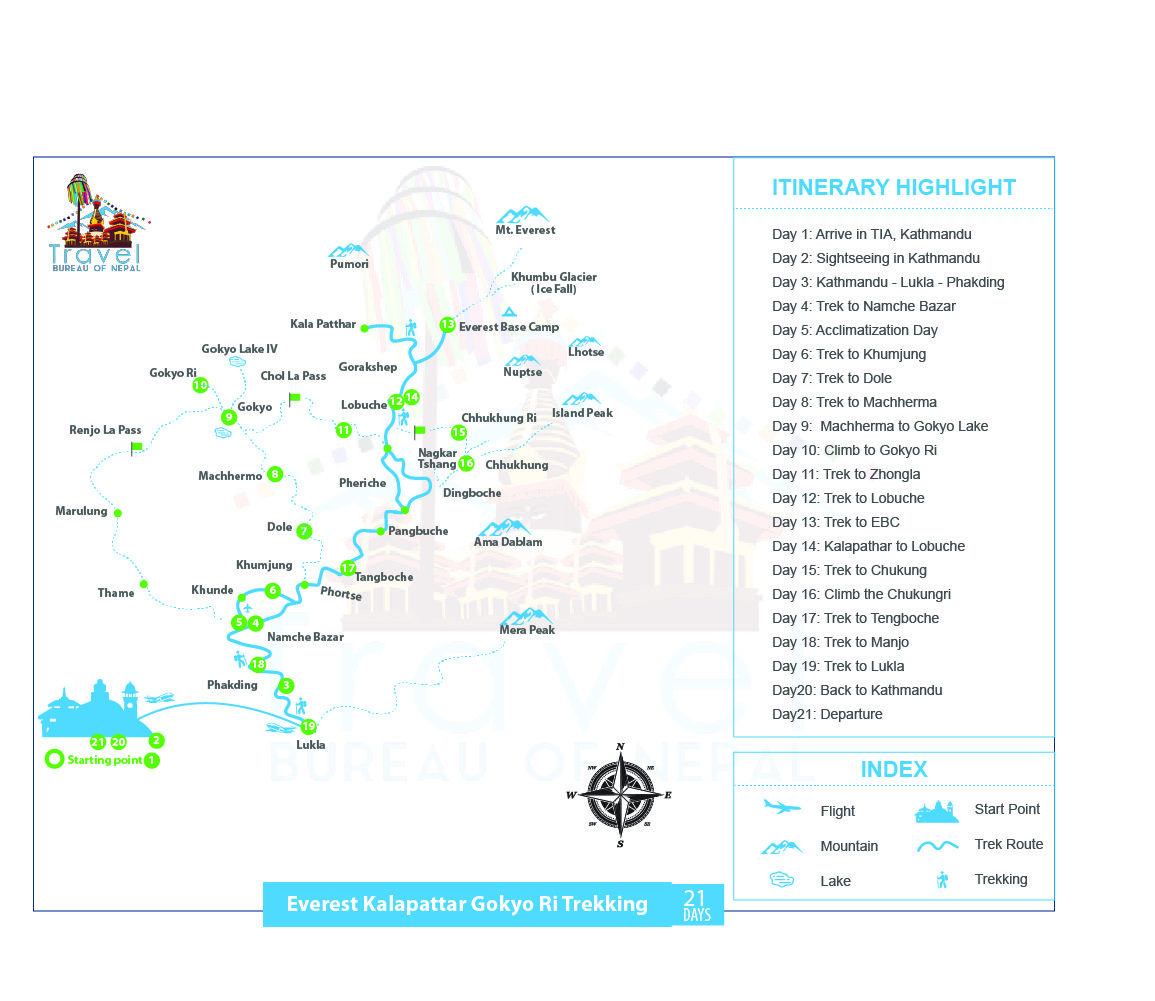
FAQs
-
Is a Trekking Guide required for this trek?
Hiring a guide is always the best option for hiking and exploring Nepal. Trekking with a government-licensed guide ensures that you enjoy a completely safe trekking experience. Nepal's tour guides have years of expertise in the area. As a result, they can readily make decisions for you and assist you in an emergency. They will not only guarantee that you have a nice journey, but also that you eat sanitary and nutritional cuisine throughout the voyage. They will also assist you in exploring the history, arts, and diversity of people in various areas of Nepal.
-
Is travel insurance required for the Gokyo Ri Trek?
You will reach a maximum elevation of 5357m on the Gokyo Ri trip. Trekking at such a high altitude may result in health concerns such as altitude sickness. As a result, having insurance that covers your medical expenses, trip cancellation, accidents, thefts, and emergency helicopter evacuation will allow you to fully enjoy your vacation.
-
Is Gokyo Trekking a Technical Adventure?
The Gokyo trip in Nepal is a fairly difficult climb that does not require technical abilities. Trekkers will spend 5-6 hours on average going across the Himalayas' high climbs and rugged downhills. Some of the paths are difficult. Otherwise, anyone with reasonable physical fitness and prior hiking experience may finish the journey. If this is your first trek, we recommend that you undertake adequate aerobic workouts and short treks before signing up.
-
Is this trek suitable for beginners?
The secret to a good journey is to start and finish at the same speed. In other words, beginners with no prior trekking experience may accomplish the Gokyo Ri climb provided they follow a basic rule: slow and steady wins the race. Both novice and veteran trekkers may complete the journey if they are committed and avoid alcoholic beverages, drink enough water, and acclimate appropriately. However, we advise our trekkers to start cardio training 5-6 months before the trek to prepare their bodies. They can jog, hike, swim, cycle, and perform other activities.
-
What animals may be spotted on this journey?
You will be hiking through the Sagarmatha National Park on your Gokyo Ri trip, which is home to species like as the snow leopard, red panda, monkeys, musk deer, clouded leopard, Himalayan tars, wild yak, and others. As a result, you might see wild yak, Himalayan Tahr, musk deer, and other species grazing in the area throughout your journey. Aside from mammals, the national park is home to several bird species such as Pheasant, Cuckoo, Danphe, Goose, Gull, Warbler, Sunbird, Finch, Martin, and others.
-
Can I use the internet throughout my journey?
Some teahouses at higher elevations provide trekkers with WIFI access. However, the service is not free, and you will be charged a fee determined by the proprietors.

